Peter Lamberto was admitted to the California Bar in 1974. Bar Number 61813.
Lamberto Law Office
PO Box 5040
Pine Mountain Club, California 93222
Former address:
Lamberto Law Office
45 East Julian Street
San Jose, CA 95112
Law School: University of San Francisco

(more wrongful conduct coming, Lamberto sued and judgment against him for 19,470.96)
VISINI v. KIRAN RAPAL, D.D.S. - Our understanding from court records is Peter Lamberto is the attorney for the plaintiff.
In this tentative ruling the judge is sanctioning Peter Lamberto a whopping $3350. Peter Lamberto did not even bother opposing the motion brought by defendant for sanctions.
The defendant served discovery on Mr. Lamberto's client consisting of written questions to answer and a request that documents be produced.
Ultimately, motions to compel had to be filed. After reviewing the situation the judge ordered Lamberto's client to provide further responses within twenty days.
Then the judge sanctioned attorney Peter Lamberto personally for his misconduct, saying $3350 was going to be ordered to be paid within twenty days.
It is a huge amount of sanctions and, as such, should be considered when evaluating whether to hire Lambert as an attorney.
Update: - Five years later Lawzilla received an email from attorney Peter Lamberto at plamberto@gmail.com, which matches his State Bar information:
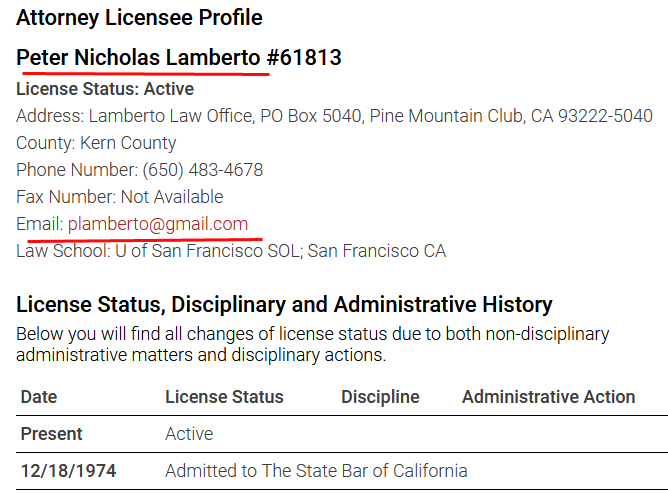
The email from Lamberto says the following:
"This sanction was never collected. The case was on the cusp of settlement when this sanction was made, obviating the need to oppose the motion. This entry is misleading and defamatory, and I demand it be Akeem down immediately."

Lawzilla's Opinion and Further Review:
After receiving Mr. Lamberto's email we went back to look at what happened in the case because we obviously want to be correct in our understanding of an order. Some issues, not reflected in an order, we would have no way of knowing, such as settlement talks and whether a sanction was ultimately "collected".
First, only the tentative ruling was originally noted, and it was noted to be a tentative court order. Our read of attorney Lamberto's message is an implied admission that this sanction against him became a final court order.
Reviewing the Santa Clara Superior Court's online case records, it appears to us that is what happened - the court's tentative ruling became a final ruling - although what is available online is sparse and does not mention the amount of sanction or details.
But since Lamberto did not say the tentative order did not become the final order in any way, something that would seemingly be noted if it happened, our assumption is the judge adopted the tentative as the final court order. This makes sense given the motion was not opposed.
Here is the court record showing the motion to compel was heard by the judge and granted.
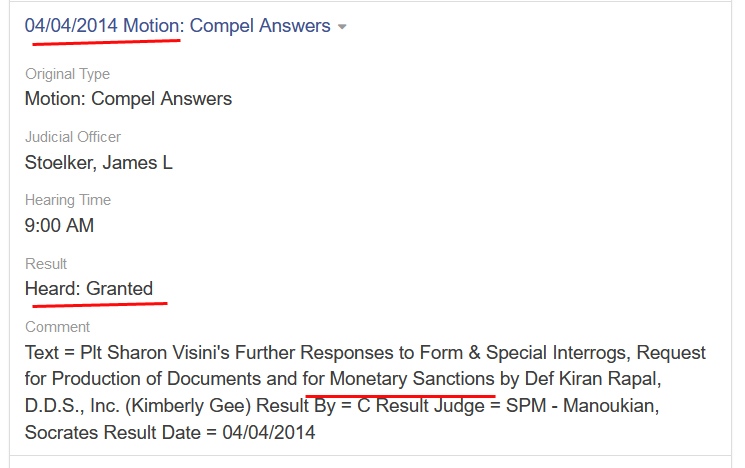
Second, we obviously could not know what was happening behind the scenes between attorneys and if the case was on the "cusp" of settlement. But it does appear that a order was made, instead of continuing the motion because it would soon be mooted by a settlement.
Almost a month later, the case records appear to reflect someone took the time to prepare a notice of an order and to file it with the court. Our assumption is this was the discovery motion.
Presumably, if a law office was doing this they decided it was worth spending time and money to have an order finalized, filed and noticed - which seems contrary to a case that is settling.
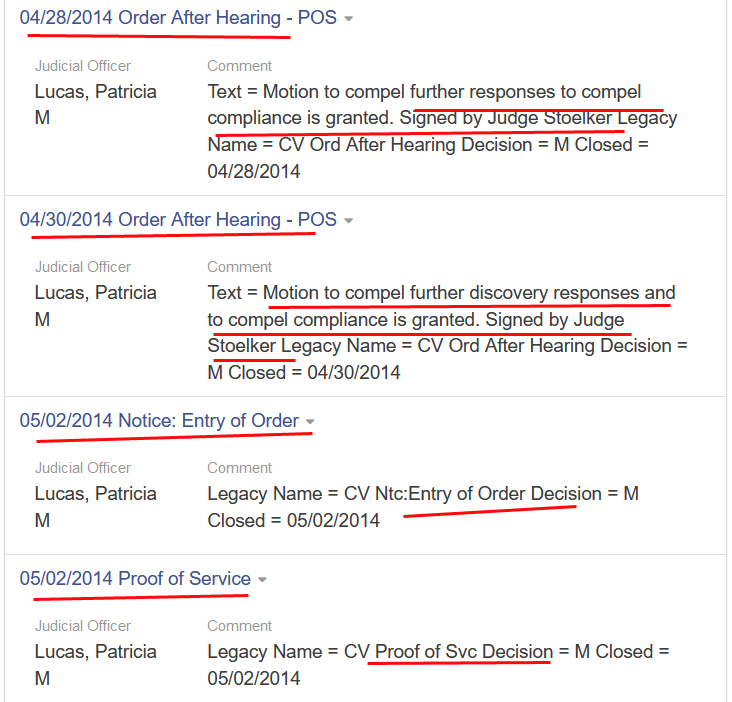
The court record indicates to us a trial setting conference was held on June 17th - roughly two and one-half months after the April 4th sanctions hearing.
There is nothing here that suggests to us the case had settled or was about to settle so as to obviate the need for the court to reserve a settlement conference date and trial date.
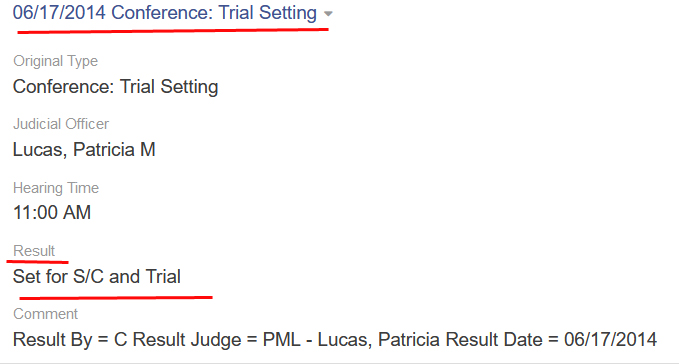
Finally, the court record indicates to us that more than four months after the sanctions hearing, attorney Peter Lamberto filed a dismissal of the lawsuit. Per his email, apparently due to a settlement.

Interestingly, we believe Lamberto's opposition to the motion to compel would have been due around mid-March.
But instead of informing the court the case was on the cusp of a settlement, it appears defense counsel informed the court that Lamberto had failed to oppose the motion.
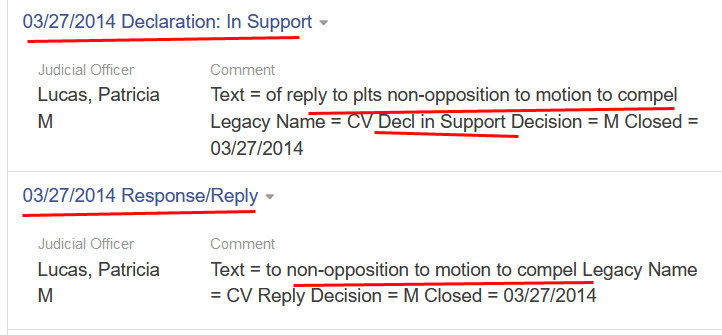
Bottom Line: In our opinion attorney Peter Lamberto was misleading in the email.
He made it appear as if the case was settling so there was no need to oppose a motion that was for all intents moot.
Oddly, even if the case was settling that does not make the court's ruling somehow defamatory, or reporting on it defamatory. Lamberto seems to be forget the judge actually made this ruling, regardless of what was happening behind the scenes. Judge for yourself his legal acumen.
But our read of the court record is that what actually happened is:
- The other attorney informed the court the motion had not been opposed by Lamberto.
- The judge held a hearing a week later and ordered sanctions by making the tentative ruling a final court order.
- Three weeks after that someone was taking the time to make an order after the hearing.
- Several days later a proof of service of notice of a court order was made.
- After another six weeks there was a court hearing to set a settlement conference and trial date.
- And then another seven weeks later, in August, a dismissal was filed by Lambert.
Does the court record read like the case was on the cusp of settling in mid-March and a motion for thousands in sanctions was a non-issue? Not in our opinion.
In our opinion, if a case is about to settle we would want our attorney to either oppose a motion for thousands of dollars in sanctions, or obtain an agreement to continue the motion, so that there can be a settlement without sanctions being ordered.
Otherwise, there might be an impression, fair or not, that the sanctions could induce a settlement or impact the amount of settlement.
Would you want your attorney to be negotiating a settlement while there is an order to pay about $3300 hanging over his head? And your head? In our view that is not an optimal negotiating position.
Lamberto now claims he let his client be sanctioned because he thought the case would settle. We wonder, did he get his client's informed permission to not oppose the motion and allow that?
Sanctions are enforceable as a judgment. Did Mr. Lamberto tell his client that fact? In case a settlement fell through?
These issues go to attorney judgment and competence. We would look elsewhere for an attorney.
Sanctions are Recoverable as a Judgment - Analysis of the little known fact that sanctions awarded in a lawsuit can be enforced as their own separate judgment. Surprise someone by putting a lien on their bank account, home, wages, etc.
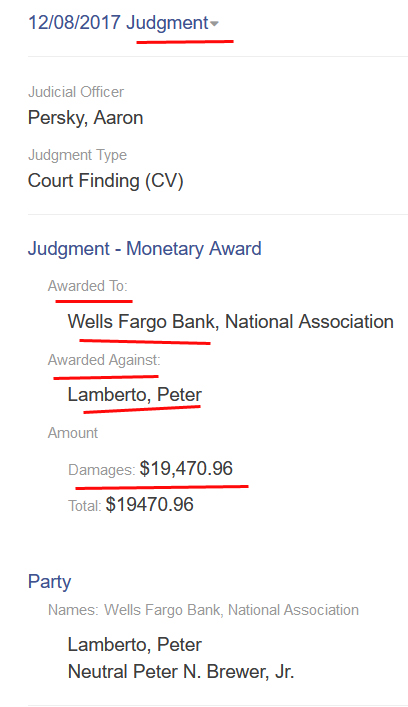
Wells Fargo Bank sued Peter Lamberto and obtained a judgment against him for $19,470.96 in damages.
The type of case was for breach of contract.
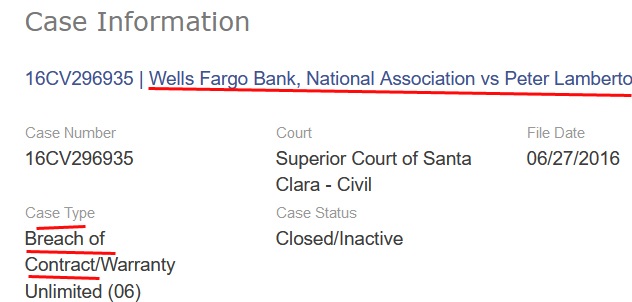
From the court register it appears Peter Lamberto did not bother to appear or defend himself, and his default was taken.

Source: Santa Clara Superior Court Case Number 16CV296935.
We asked Mr. Lamberto why Wells Fargo had a judgment against him and whether it had been paid.
His response was "It was personal. Which means none of your business."
Maybe we missed it, but we did not recall seeing in the online court file a satisfaction of judgment saying the judgment had been paid, which is why we asked.
Given Lamberto's rude response we assume he is a deadbeat and still owes money.
It is also possible the judgment is reportable to the California State Bar, but without knowing the details of what happened, and Lamberto being secretive, that issue is unknown.
The "Streisand Effect" refers to lawyers, originally in a legal matter involving Barbra Streisand, trying to repress something they do not like, something that people would likely not even see, and thereby causing the matter to blow-up into something much bigger which harms their client.
In our opinion a good attorney is not only the master of the law, but the reference the public sometimes hears referring to an attorney as a "counselor", is taken to heart.
That is, the attorney is able to exercise good judgment and know when not to push an issue because of the potential blow-back.
Here, attorney Peter Lamberto made a decision about how to treat our short 5-year old article about an obscure trial court tentative ruling imposing sanctions.
The ramification has been a closer and detailed look at the ruling and his claims in an email.
Now this is a much bigger article, with copies of outtakes from the court docket and questions about attorney competence.
One judge has already sanctioned Lamberto for his misconduct. $3350 is not a trivial sum in our view. He has been sued and judgment entered against him for almost $20,000.
In our bottom-line opinion, Peter Lamberto is not an attorney, or a person, we would recommend.